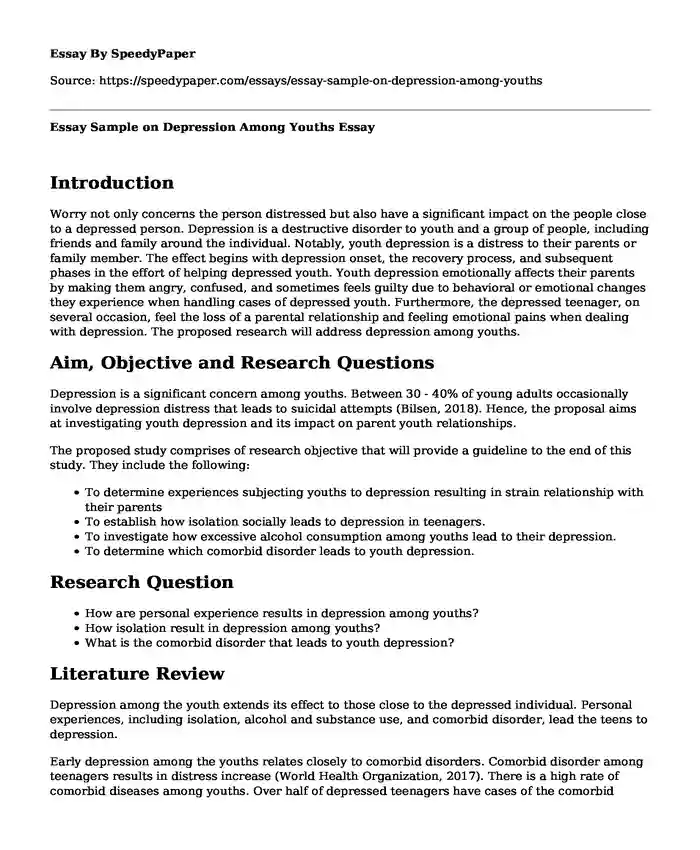
| Type of paper: | Course work |
| Categories: | Depression |
| Pages: | 3 |
| Wordcount: | 774 words |
Introduction
Worry not only concerns the person distressed but also have a significant impact on the people close to a depressed person. Depression is a destructive disorder to youth and a group of people, including friends and family around the individual. Notably, youth depression is a distress to their parents or family member. The effect begins with depression onset, the recovery process, and subsequent phases in the effort of helping depressed youth. Youth depression emotionally affects their parents by making them angry, confused, and sometimes feels guilty due to behavioral or emotional changes they experience when handling cases of depressed youth. Furthermore, the depressed teenager, on several occasion, feel the loss of a parental relationship and feeling emotional pains when dealing with depression. The proposed research will address depression among youths.
Aim, Objective and Research Questions
Depression is a significant concern among youths. Between 30 - 40% of young adults occasionally involve depression distress that leads to suicidal attempts (Bilsen, 2018). Hence, the proposal aims at investigating youth depression and its impact on parent youth relationships.
The proposed study comprises of research objective that will provide a guideline to the end of this study. They include the following:
- To determine experiences subjecting youths to depression resulting in strain relationship with their parents
- To establish how isolation socially leads to depression in teenagers.
- To investigate how excessive alcohol consumption among youths lead to their depression.
- To determine which comorbid disorder leads to youth depression.
Research Question
- How are personal experience results in depression among youths?
- How isolation result in depression among youths?
- What is the comorbid disorder that leads to youth depression?
Literature Review
Depression among the youth extends its effect to those close to the depressed individual. Personal experiences, including isolation, alcohol and substance use, and comorbid disorder, lead the teens to depression.
Early depression among the youths relates closely to comorbid disorders. Comorbid disorder among teenagers results in distress increase (World Health Organization, 2017). There is a high rate of comorbid diseases among youths. Over half of depressed teenagers have cases of the comorbid disorder. Some of the critical comorbid conditions that result in depression include conduct disorders, dysthymia, anxiety, and disruptive disorders.
Also, substance abuse among youths is a significant risk factor leading them to depression. Alcohol is the leading risk factor causing approximately 70% of the depression cases among adolescents. However, those youths abusing marijuana have a lower percentage than alcohol users. Drug use contributes to about 60% of cases of depression in teens (Keles, McCrae & Grealish, 2020). They are thus leading to strained parent youth relationships. Finally, unfriendliness situations also lead youths to depression. Social isolation, which is the withdrawal of an individual from other peers, causes depression. Teens feel rejected by their peer groups hence feeling depressed.
Research Methodology
The proposed study would apply the phenomenological research method. Effective establishment of relationship problems among youth depression, phenomenological interview, and analysis of data will be completed in the study. An extensive review of this literature on depression initiates for strengthening the model. The phenomenological design focuses on occurrence interest as experienced by the depression victim, which is valuable. Also, sampling and questioning techniques will be separate.
Sampling
The purposive approach will apply in sample selection to get respondents involved in the study. Youths and their parents are the main participants going to be selected using purposive design to take part in the survey. The method only includes respondents with experience of a problem under study (Palinkas, 2015). Hence it is essential to researchers since it includes participants who only meet the standard of the review.
Data Collection Method
Audio taped and questionnaire discussions are the main approaches that will apply in the study. An investigator is going to arrange an interview with participants included in the survey at a convenient place and time. The methods are essential due to the nature of the study that needs the comfort and privacy of respondent six youths, and five parents are the primary participant going to select for this study. The interview of each member would be separate.
References
Bilsen, J. (2018). Suicide and youth: risk factors. Frontiers in psychiatry, 9, 540.
Keles, B., McCrae, N., & Grealish, A. (2020). A systematic review: the influence of social media on depression, anxiety and psychological distress in adolescents. International Journal of Adolescence and Youth, 25(1), 79-93.
Palinkas, L. A., Horwitz, S. M., Green, C. A., Wisdom, J. P., Duan, N., & Hoagwood, K. (2015). Purposeful sampling for qualitative data collection and analysis in mixed method implementation research. Administration and policy in mental health and mental health services research, 42(5), 533-544.
World Health Organization. (2017). Depression and other common mental disorders: global health estimates (No. WHO/MSD/MER/2017.2). World Health Organization.
Cite this page
Essay Sample on Depression Among Youths. (2023, May 01). Retrieved from https://speedypaper.com/essays/essay-sample-on-depression-among-youths
Request Removal
If you are the original author of this essay and no longer wish to have it published on the SpeedyPaper website, please click below to request its removal:
- Religion and Politics Essay Sample for Free
- Declaration of Independence Essay Sample for Free
- Essay Example on Preventing System Failures
- Free Essay: Tracing Migration Patterns of Terrestrial Animals Using Stable Isotopes
- Free Essay about Ulcer, Its Causes, Treatment and Prevention
- Paper Example: Single and Two-Parent Households and the Effects on Children
- Free Essay: Misconception That Physical, Cognitive and Mental Decline Are Inevitable in Old Age
Popular categories




